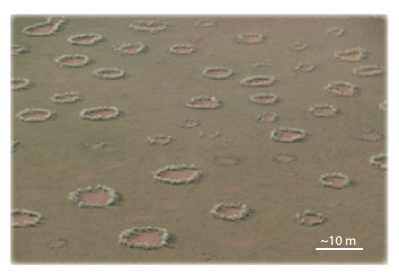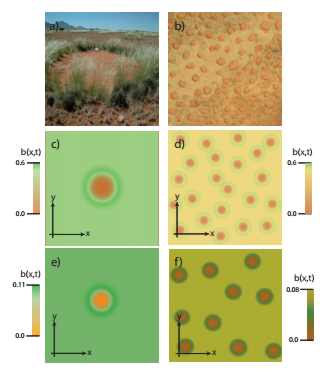| A Computer Model Of Fairy Rings |
| Written by Mike James | |||
| Sunday, 07 July 2013 | |||
|
Yes, fairies have nothing much to do with fairy rings. A new computer model explains them away and suggests that circles may be a common property of some types of complex system. This particular type of fairy ring isn't something to do with mushrooms or fungi fruiting bodies. Instead the subject of the study is the strange circular barren patches that often turn up in the middle of healthy growth. They are particularly common on the grasslands of southern Africa where they are between 2 and 10 metres.
Fairy circles observed in the pro-Namib zone of the west coast of Southern Africa (Photo: M. Johny Vergeer). Until recently very little was known about the causes of these circles. They seemed stable and long lasting but without obvious cause. A recent simulation based on the idea that this is something to do with way root systems interact in their extraction of nutrients has provided an explanation that might generalize to other systems. The idea is simply that a single plant has a much bigger root system than you might expect. The simulation postulates that vegetation moves into a region and there is a boundary between colonized an otherwise barren ground. As the barren region shrinks plants move closer together than their roots interact in an attempt to extract limited resources water etc. As the roots keep the plants apart the result is that a circle provides the best packing around a boundary - hence fairy circles.
To be a little more precise, the simulation starts from a standard logistic equation which relates the rate of change of biomass to natural production of new plants by reproduction and loss of plants due to old age and predation. The new element is a distance-based interaction between plants, which adds an additional source of biomass loss based on distance. This turns the logistic equation into a Fisher–Kolmogorov–Petrovsky–Piscunov (FKPP) equation, but extended by non-local interactions. The FKPP equation is known not to form stable regions, but this modified FKPP has a region where stable states form. As the controlling factor for packing are the limited resources the model predicts that the circles should be bigger where resources are in short supply. This does seem to be the case for the fairy circles studied in the south of Africa.
Of course, the fact that the model produces similar structures isn't proof that this is the cause of fairy rings. It has been suggested that termites have something to do with the matter, for example. More Information
Related ArticlesComputer Model Explains High Blood Pressure Simulation Reveals Best Strategy For Congested Traffic
To be informed about new articles on I Programmer, install the I Programmer Toolbar, subscribe to the RSS feed, follow us on, Twitter, Facebook, Google+ or Linkedin, or sign up for our weekly newsletter.
Comments
or email your comment to: comments@i-programmer.info
|
|||
| Last Updated ( Thursday, 01 August 2013 ) |



